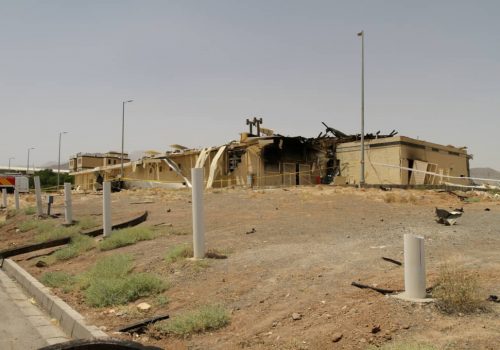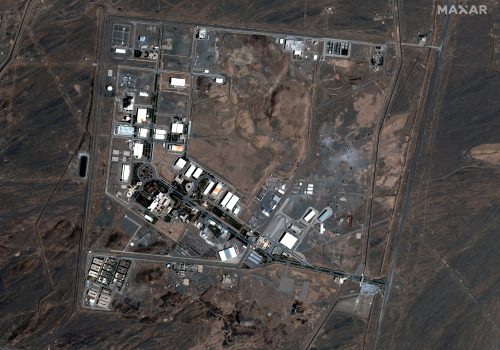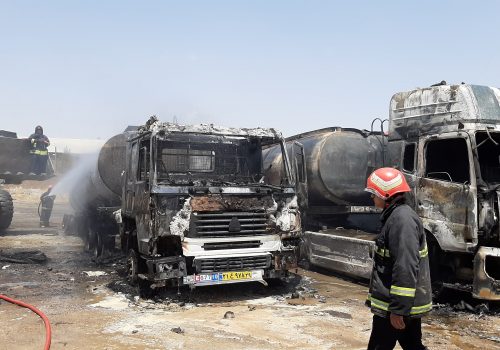Israel’s ‘shadow’ war with Iran risks playing out in the open
When Iran and the world powers signed the Joint Comprehensive Plan of Action (JCPOA) in 2015 after years of painstaking negotiations, Israel was among the few countries that opposed the agreement, arguing that it would not contain its adversary’s nuclear program for the long term. After the Donald Trump administration quit the deal in May 2018, Israel escalated a shadow war with Iran to disrupt Iranian shipping and retard Iran’s nuclear advances, as the Islamic Republic had stopped implementing its JCPOA commitments in response. That war has now come increasingly into the open and threatens to complicate the Joe Biden administration’s efforts to revive the nuclear deal and could spark a wider conflict.
In April, the Iranian cargo ship Saviz—reportedly used as a surveillance ship—was hit by a mine in the Red Sea, an attack attributed to Israel. Press reports indicate that Israelis notified the United States after the attack. A March Wall Street Journal report indicated that “Israel has used weaponry including water mines to strike Iranian vessels” since late 2019. Meanwhile, Tehran has struck Israeli ships; in March, it was reported that an Iranian missile hit an Israeli cargo vessel sailing from Tanzania to India in the Arabian Sea.
Additionally, in the aftermath of Iran’s intervention in Syria to buttress the Bashar al-Assad government, Israel—fearful of the concentration of Iran-backed proxies near its borders—has embarked on a sustained campaign to prevent Iran from transferring sophisticated weapons to militant group Hezbollah and building precision weapons factories in Syria. According to an annual report by the Israeli military, there were around fifty airstrikes on arms depots and military targets in Syria during 2020 alone.
The shadow war has continued on the nuclear front too. Israeli officials have openly commented that they intend to roll back Iran’s nuclear program and have little faith in diplomatic agreements. “We continue to act on all fronts to reduce the possibility that Iran will become a nuclear power, and we will continue to do this part of protecting our security,” General Gaby Ashkenazi, a former chief of staff of the Israeli military and current Israeli foreign minister noted.
In July 2020, a bomb exploded at the Natanz enrichment facility, causing significant damage to a warehouse used for the assembly of centrifuges. Fereydoun Abbasi, the chairman of Parliament’s Energy Commission, told Tasnim News Agency that explosive materials were planted inside a heavy desk and sent to Natanz. This attack occurred only six days after a mysterious gas tank explosion near the Parchin military complex, suspected as the venue of past nuclear research. Despite internal pressure for a counterattack, Tehran chose not to respond.
In November 2020, Mohsen Fakhrizadeh—who was reportedly the father of a secret nuclear weapons program in Iran up until the early 2000s—was assassinated while traveling outside Tehran. American officials have indicated that Israel was responsible. In response, Iran’s parliament quickly passed legislation mandating the government escalate Iran’s nuclear activities, including enriching uranium to 20 percent purity and ceasing the implementation of the nuclear Non-Proliferation Treaty’s Additional Protocol, an intrusive inspections regime that Iran accepted as part of the JCPOA.
The latest sabotage incident on April 11 caused a blackout at the Natanz facility and major damage. The attack, widely believed to be orchestrated by Israeli intelligence agency Mossad, took out a number of Iran’s older and “least efficient” IR-1 centrifuge machines, according to Iranian foreign ministry spokesman, Saeed Khatibzadeh. Meanwhile, Alireza Zakani, head of the Parliament Research Center, has noted that “several thousands” of centrifuges were damaged or destroyed.
Centrifuge machines are very sensitive to abrupt fluctuations and disruptions of power and are protected by an Uninterrupted Power Supply (UPS) system, which is supposed to function as a backup to the power grid. It is evident that the power grid and UPS failed. Reports indicate that an explosive device was secretly smuggled into the facility and was detonated remotely.
Iranian Foreign Minister Mohammad Javad Zarif called the attack, which took place just days before talks on reviving the JCPOA were to resume in Vienna, “nuclear terrorism” and a “war crime,” vowing revenge. A day after the attack, Iran informed the International Atomic Energy Agency (IAEA) that it would begin enriching uranium to 60 percent purity, closer to the 80-90 percent concentration needed for nuclear weapons. France, Germany, and Great Britain (E3)—all signatories to the JCPOA—have “noted” Iran’s decision with “grave concern,” calling it a serious development. The US also called it a “provocative” move.
The timing of the attack is significant in two ways. First, the attack came a day after Iran’s National Nuclear Technology Day, an annual celebration of Iran’s nuclear advancements introduced in 2006 by then President Mahmoud Ahmadinejad to mark Iran’s first successful enrichment of uranium. This year, Iran unveiled IR-5, IR-6, and IR-9 centrifuges, which are fifty times more efficient than the IR-1 versions used in that initial enrichment.
Second, and more importantly, the preparators sought to undermine the nuclear talks in Vienna. After four years of Trump’s relentless campaign to destroy the multilateral nuclear accord, Iran and the US have begun negotiating—albeit indirectly—a solution to bring both countries back to full compliance to the JCPOA. In this vein, Russia’s ambassador to the IAEA has observed that “Those who undertook an act of sabotage against the nuclear facility in Natanz probably wanted to undermine the process of JCPOA restoration. They underestimated the possibility of side effects”—a reference to Iran’s decision to escalate its nuclear activities.
Iranian negotiators were already under domestic pressure to quit the talks before the attack on Natanz. Rostam Ghassemi, a former oil minister and the former commander of the Islamic Revolutionary Guard Corps (IRGC)-controlled Khatam Al-Anbiya Construction Headquarters, tweeted that “proper response to sabotage operations is not a statement; rather, effective measures…if the negotiation table of these [Iranian diplomats] is not undermined, they should tell [foreign diplomats] that the Islamic Republic of Iran, is not just the administration [of President Rouhani]. It has an army and IRGC which can no longer take it.”
Similarly, Abbas Moghtadaei, the deputy chairman of parliament’s national security and foreign policy committee, said that “talks under pressure has no meaning.”
Eric Brewer, a senior fellow at the Washington-based Center for Strategic and International Studies, believes that the attack could “make it harder for Iran to compromise in Vienna” out of fear of looking weak. So far, however, Iranians have seemingly not taken the bait and Deputy Foreign Minister Abbas Araghchi will participate in the talks.
The Israeli attack puts Iran in a difficult situation—either they take another humiliating hit or risk escalation with Israel and a confrontation with the US. The latest incident has put Washington in a difficult situation too, as it is reluctant to openly condemn a long-time partner even as it seeks to restore engagement with Iran. Tehran should avoid taking the spoilers’ bait and demonstrate flexibility in the talks. The Biden administration would be well advised to underline its commitment to a peaceful resolution of Iran’s nuclear issue. Otherwise, the shadow war is likely to become more open and more dangerous.
Sina Azodi is a nonresident fellow at the Atlantic Council and a visiting scholar at the George Washington University’s Institute for Middle East Studies. He is also a PhD Candidate in International Relations at University of South Florida. Follow him on Twitter @Azodiac83.
Image: An Iranian soldier stands guard inside the Natanz uranium enrichment facility, 322km (200 miles) south of Iran's capital Tehran March 9, 2006. REUTERS/Raheb Homavandi


